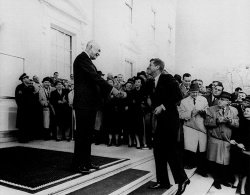
The New York Times front page from two days after the election: November 10, 1960.
Introduction
After eight years of Eisenhower's presidency, voters were generally happy with the Eisenhower administration, but many continued to have concerns about the Cold War.
The election was held on November 8, 1960.
Republican nomination
Vice President Richard M. Nixon faced little opposition for the Republican nomination. He chose former Senator and Ambassador Henry Cabot Lodge, Jr. as vice presidential candidate. Barry Goldwater was nominated, but declined the nomination and supported Richard Nixon.
Democratic nomination
Candidates for the nomination included:
Kennedy's Catholic religion was raised as an issue by some factions, but in the end Kennedy's youth and war record impressed delegates, and his popularity and campaign spending carried the day. Kennedy chose Johnson as vice presidential candidate to balance the ticket and secure Southern votes.
Other candidates
Independent candidate Harry F. Byrd, a maverick segregationist Democrat, received 15 electoral votes; 14 from unpledged Democratic electors and one from an elector pledged to Nixon.
General election

President Dwight D. Eisenhower greets President-elect John F. Kennedy, December 1960.
A crucial factor in this election was the first televised presidential debate. Nixon refused television makeup and was feeling sick, having injured his knee on the way to the studio. He expected to win voters with his foreign-policy expertise, but people only saw a sickly man sweating profusely and wearing a gray suit that blended into the scenery while his rival, Kennedy, looked great. Later research showed that those who had listened to the debate on radio thought Nixon had won, but the television audience gave the win to Kennedy. Nixon's negative experience in the debates caused him to shun debates in his 1968 and 1972 campaigns, and the next presidential debates would not be held until 1976.
The main economic issue during the election was the USSR's high economic growth rate in comparison to the United States'. According to analyses at the time, the Soviet economy was expected to overtake the American economy by 1984. Kennedy also attacked the Republican administration for allowing a missile gap by not matching Soviet defense spending and allowing the military to weaken.
Still, the election was close and Kennedy only defeated Nixon by two tenths of a percentage point (0.2%.) Some speculate that Kennedy used his political connections to buy out votes in certain states. The Republican party urged Nixon to pursue recounts and challenge the validity of some of the votes for Kennedy, especially in the pivotal states of Illinois, Missouri and New Jersey, where marginal wins handed Kennedy the election. However, Nixon refused, saying that to do so would cause a constitutional crisis.
The actual number of votes received by Byrd and Kennedy are difficult to determine. In Alabama, the statewide primary had chosen eleven electors, five of which were pledged to vote for Kennedy, and six of whom were free to vote for anyone they chose. The ballot gave voters a choice between Nixon and a slate of Democratic unpledged electors. It is unclear how many of the 324,050 Democratic votes in Mississppi were for Byrd, and how many were for Kennedy. This margin is easily large enough to make Nixon the winner of the popular vote instead of Kennedy.
Byrd received electoral votes for President from Alabama (6), Mississippi (8) and Oklahoma (1). Thurmond received electoral votes for Vice President from Alabama (6) and Mississippi (8). Goldwater received one electoral vote for Vice President from Oklahoma.
See also
-
President of the United States
-
U.S. presidential election
-
U.S. Senate election, 1960
-
1960
-
History of the United States (1945-1964)
-
Canada and the 1960 U.S. presidential election
- Other close U.S. presidential elections: 1800, 1844, 1876, 1884, 1888, 1916, 1968, 1976, 2000, 2004
Other elections
Last updated: 05-02-2005 12:32:00